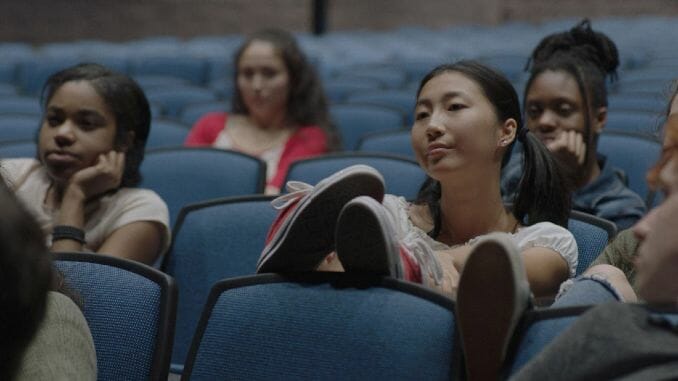Well-Acted Beast Beast‘s Coming-of-Age Drama Overcomes Its Clumsy Gun Commentary

In the boondocks of ethnoburb Georgia where I grew up, youthful boredom is often undercut by the angst-fueled antics of teenagers. Kids make decisions that result in what I colloquially refer to as suburban legends—stories people tell in hushed tones in high school cafeterias in the South. They often feature kids who got caught skipping class to have sex in the woods or met up at a Walmart to fight, boys who got into metal-bending car crashes after accepting fatal dares to drive in the opposite direction of traffic on the highway. Things of that ilk. What makes these Southern suburban legends so fascinating is not merely their implicit, casual violence—an intermittently macabre consequence of kids trying to defy the idea that their small town and therefore their small lives were forgettable—but also the chilling intrigue, the element of entertainment that comes from recounting these stories and thereby participating in the manufactured lore that one’s small town is not so unremarkable after all.
Writer/director Danny Madden’s debut feature Beast Beast, a coming-of-age drama based on his 2018 short Krista, distinctly unfurls the interconnected lives of three teenagers in the South whose actions result in one such suburban legend. There’s Krista (Shirley Chen), a talented theater kid; Nito (Jose Angeles), a laid-back skateboarder; and Adam (Will Madden), a local burnout turned pro-gun YouTuber. If you just tensed up at the phrase “pro-gun YouTuber,” well, of course you did. But also, you should be forewarned that you may be disturbed by Adam’s arc in the film which involves the sort of violence that’s implication made you wince in the first place.
Beast Beast doesn’t dive headfirst into Elephant territory by any means. In fact, most of the film possesses striking performances by the main three actors and pleasant, quotidian pubescent vibes. Beast Beast falls into the pantheon of recent films about teenagers like Skate Kitchen or Mid90s where nothing happens—no one is rearing up for some climactic school dance or sports championship—but the mood and aesthetics of the film dazzle. Also, there’s skateboarding. Beast Beast opens with a dizzying orbital shot: Krista is in theater class where she and her peers stand in a circle and perform some warm-up exercises. As the camera spins ‘round and ‘round, the kids chant, “Beast beast ready to act,” repeatedly extending their bodies upward into a full standing position from their initial animalistic low crouch. It’s an effective, invitational shot and immersive first step into the movie. It’s also the memefied moment in which Leonardo DiCaprio’s Once Upon A Time In Hollywood character would point at the screen, indicating that the title of the movie has been named by the movie’s characters. But the effectiveness of this opening scene, spliced with Adam’s weapon tutorial videos and footage of Nito skateboarding, comes from the economical way it characterizes each of the characters and establishes the anxiety-laden, sprightly, youthful tone of the film itself.
The phrase “beast beast” is the film’s narrative sunrise statement. They are the magic words the film’s theater kids use to summon their aggression, their anger, their spirit of fight. It encompasses the violence Adam both channels and vilifies to justify his gun use. It encapsulates the mood of the thespian performance that Krista practices throughout the film and the gall it takes for Nito to begin committing petty crimes after befriending a casually racist local poser named Yoni (Daniel Rashid), who exclusively refers to him as “my boy” or “Manny Pacquiao.” (Yoni sucks, but in that non-malicious way that people let backwards-baseball-capped 17-year-old white boys get away with.)
“Beast beast” also refers to the way Nito comes to Krista’s defense when she’s swept up by a grossly opportunistic white boy—whom Nito punches before getting detained by the cops himself. While Krista is struggling to break free from the unwanted embrace of a random boy, the music stops and Madden shrouds her in the party lights, her whipping hair filling up the frame. There is ambiguity throughout, regarding where this boy’s hands are and how close the cops are to collecting them. Here, Nito is a beast, non-pejorative, for coming to Krista’s defense and because of the way he defends himself the police perceive him as a “beast.” To my point about the dazzling aesthetics of the film and the strength of the film’s young cast, there is a sequence during this scene where Nito encourages a now-free Krista to run away, then dodges blows from some retaliatory teenage boys. Nito runs through a crowded room and slides underneath a beer pong table, the camera following along in a series of wickedly choreographed shots. Chen and Angeles easily convey the panic and sense of urgency that a situation like this would conjure.
-

-

-

-

-

-

-

-

-

-

-

-

-

-

-

-

-

-

-

-

-

-

-

-

-

-

-

-

-

-

-

-

-

-

-

-

-

-

-

-








































